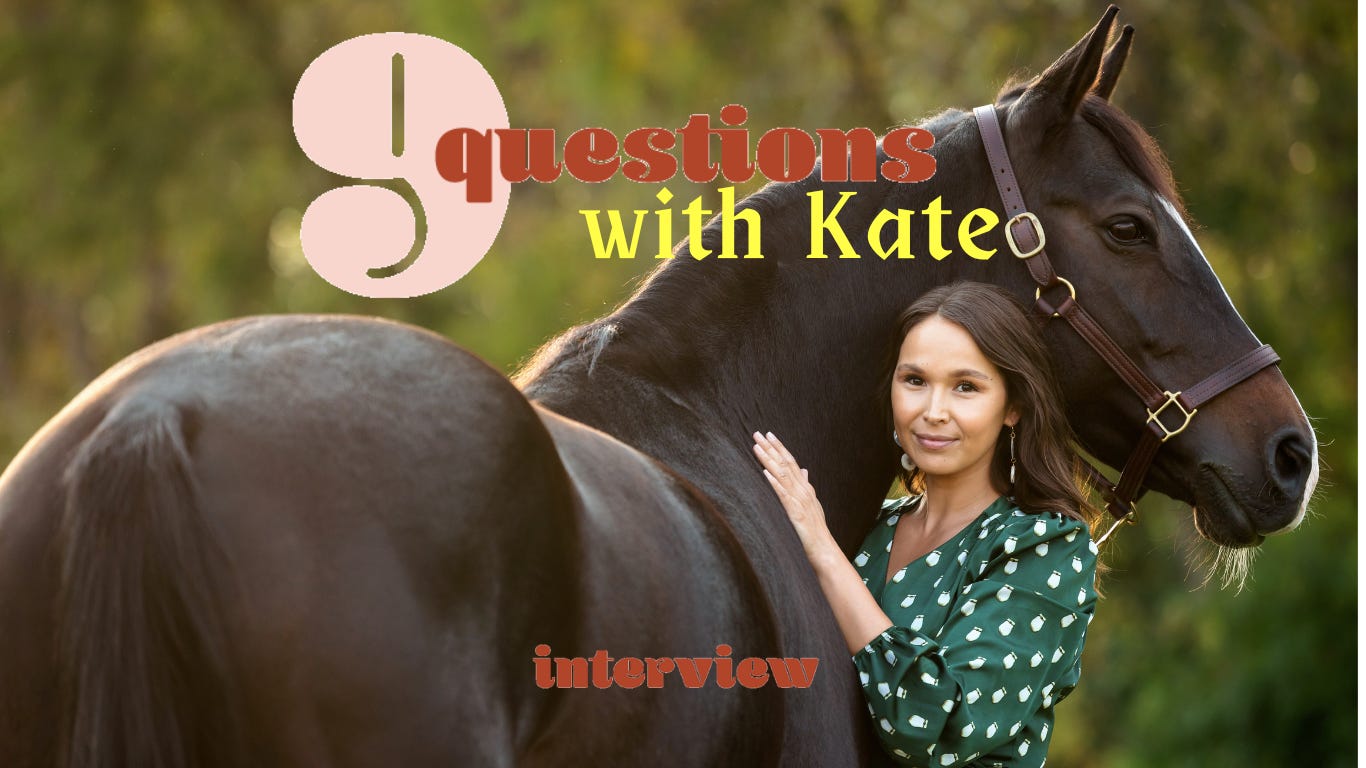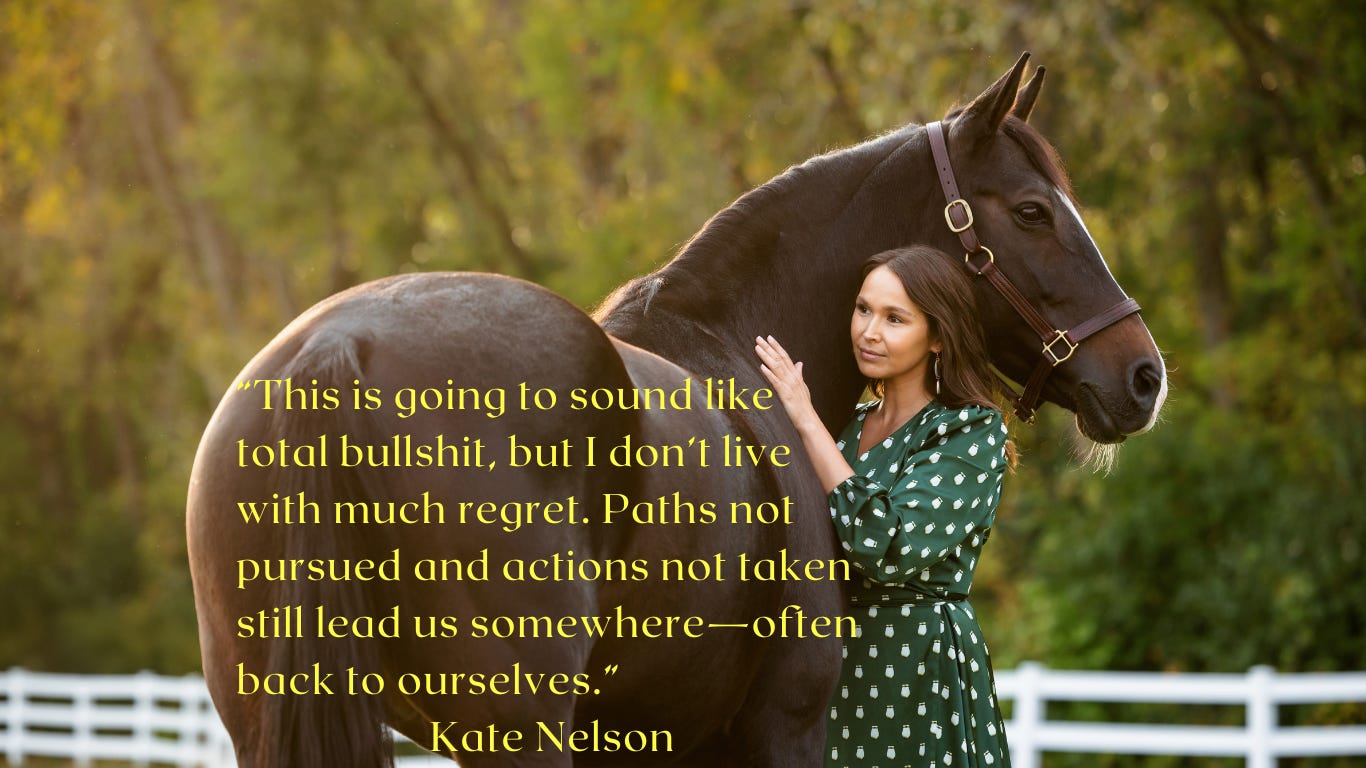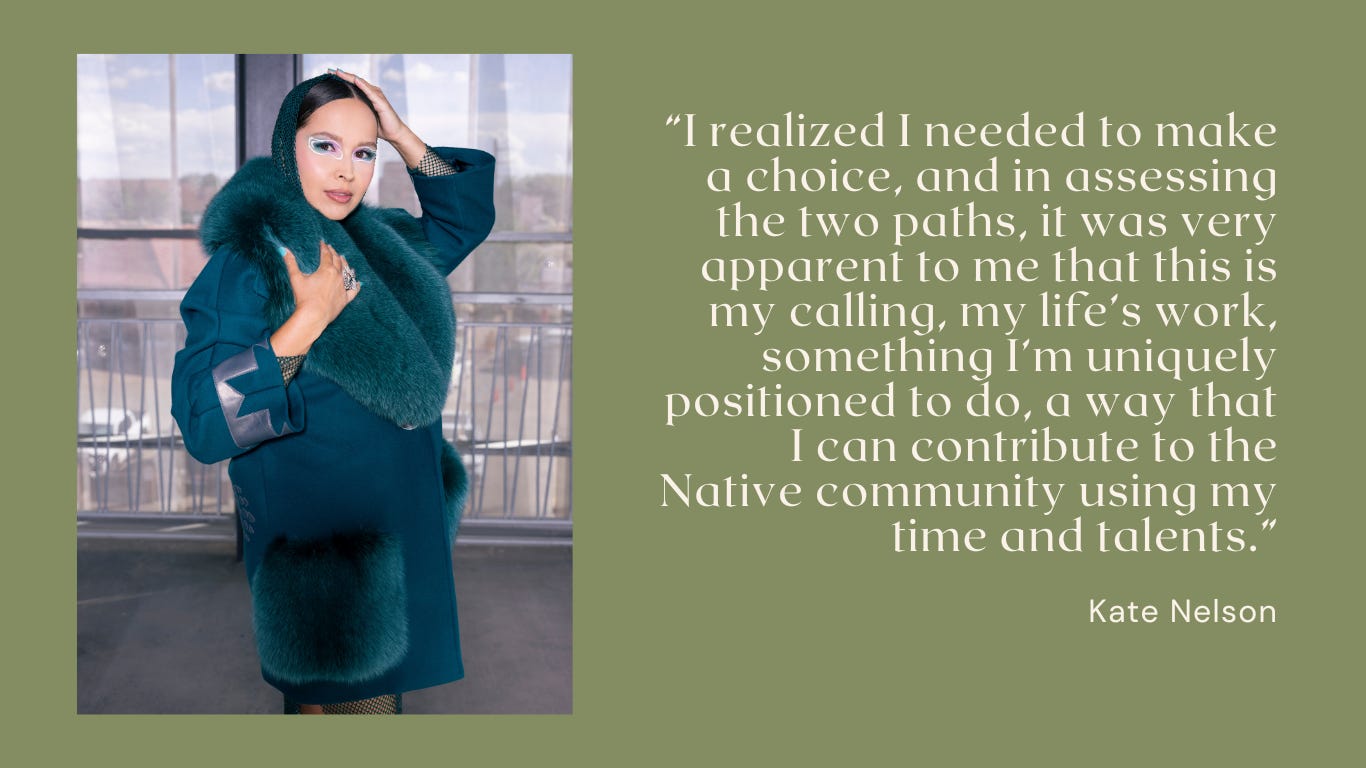9 completely random and personal questions with Tlingit writer, editor, and equestrian Kate Nelson
We zero in on radical self love and reflection, her passionate focus on Indigenous topics, what she's looking for when writers pitch a magazine, and her (sometimes nomadic) office setup.
In today’s special edition of bathmilk, I sit down with someone I admire from afar (storytellers, horse girls, comedians, mothers, dreamers, gorgeous fail-artists and more) and ask them a series of personal questions.

Meet Kate Nelson, an Alaska Native Tlingit tribal member and an award-winning writer and editor based in Minneapolis. She's passionate about highlighting Indigenous change makers and issues. Her work has appeared in top publications like The New York Times, National Geographic, TIME, Vanity Fair, ELLE, Esquire, Teen Vogue, the BBC, The Guardian, HuffPost, W Magazine, Architectural Digest, Condé Nast Traveler, Forbes Travel Guide, the Cut, The Daily Beast, Bustle, Saveur, Andscape, Atmos, Civil Eats (to name JUST A FEW).
With over 16 years of experience, Kate was the editor-in-chief of Artful Living, a chic quarterly lifestyle mag known for its stunning content and design — where I initially met her. This makes her one of the few Native American chief magazine editors in the country and one of the youngest female chief editors in the Twin Cities market.
I’m not afraid to write it how it is: Kate has always been my favorite editor to work with. Her red-lines and feedback mentored me throughout a majority of my writing career. She makes words beautiful. In 2024, she stepped down to fully focus on Indigenous topics, which she believes is her true calling.
Kate has interviewed big names like Padma Lakshmi, Sean Sherman, Quannah ChasingHorse, Sterlin Harjo, Mo Brings Plenty, and more. She's a two-time James Beard Foundation Media Award nominee, a member of the Indigenous Journalists Association, and an advisor for the magazine Calling All Horse Girls. A lifelong storyteller, Kate's also an avid (fellow) equestrian and pop culture junkie. If you want a sample of her work, I adore this piece.
Without further ado….

BATHMILK: The thing that you do, regularly, that’s hard as shit but worth it.
KATE: These days, I’m striving to listen to myself more, which I think is really a form of radical self-love. As women—especially intentional, impactful, ambitious women who want to effect change in our personal and professional lives—we (and society) hold ourselves to pretty unrealistic standards. As I’ve become more aligned professionally, I’ve been examining other areas of my life, because I’m really in search of that same sense of peace, balance, and flow across all aspects. To me, that’s living fully, and we all deserve to live fully.
This is definitely easier said than done, especially in a world where we’re constantly bombarded with distractions and difficult news and where we’re encouraged to prize productivity and output over peace. This year, I’ve been doing more self reflection, giving myself grace, and letting my mind, body, and spirit really guide me. Lately, they’ve been telling me to slow down and allow myself to just be. That’s tough when you’re used to operating at a ridiculously fast pace with a high capacity and you feel a pressure and responsibility to do great things. But I’m doing the important, oft challenging work of honoring and caring for myself the way I would others, and that starts with truly listening—even if what you have to say to yourself is hard to hear.
BATHMILK: Where do you spend most of your time writing? And can you (for my own ASMR satisfaction) list out the items on your desk?
KATE: I have a pretty lovely office setup that feels cozy and a little unkempt—messy work settings have been associated with brilliance, after all—with lots of precious objects throughout, like my late dad’s chess set, vintage crystal horse bookends, and some of the awards I’ve earned throughout my career. (I used to store these accolades tucked away in a box, thinking it was boastful to display them, but these days I’m all about women embracing their greatness.) My desk is dotted with tall stacks of magazines as well as what I call “warm fuzzies”—sweet little notes from colleagues, interview subjects, and loved ones gathered over time. A lot of these items are one of one, and I like to use vintage trays and log holders to corral the clutter. Taken altogether, these things represent who I’ve been and who I’m becoming.
That said, I’m a bit of a nomadic writer, working wherever I feel most comfortable in that moment. So while I spend some time writing in my office, I will also set up shop on the sofa (Indigenous author Mona Susan Power and I bonded over our stacked-pillow approach), at the dining room table, on the floor with my laptop propped up on an ottoman, whatever suits me. I travel quite a bit for work, so I’ve also gotten pretty used to writing at the airport, on a plane, on the go. That’s the beauty of writing—you can do it wherever and however the words will flow out of you.
BATHMILK: You stepped down from editor at Artful Living to focus on Indigenous topics. Was there a single moment that this decision was made? A poignant moment of calling?
KATE: It was really an organic evolution over time, beginning with the 2021 Esquire article I wrote about Native American chef Sean Sherman opening his restaurant, Owamni, amid the pandemic and the racial reckoning that spiraled out from Minneapolis following the police killing of George Floyd. That made it clear to me how absolutely necessary it is to amplify Indigenous issues on a national level and how devoid mainstream media has historically been of Native voices. From there, I spent the next couple years freelance writing about Native topics while still editing Artful Living—essentially doing two full-time jobs. In 2023, I realized I needed to make a choice, and in assessing the two paths, it was very apparent to me that this is my calling, my life’s work, something I’m uniquely positioned to do, a way that I can contribute to the Native community using my time and talents. Although it was a tough decision to step down from Artful Living, I haven’t looked back since shifting to fully focus on Indigenous topics last year.

BATHMILK: Let’s do a quick round of five things: 1 thing you’re consuming (could be food OR television), 1 thing you couldn’t live without, 1 thing you learned last year, 1 thing you hate, and 1 thing you want to do this year.
KATE:
One thing you’re consuming: I tend to take a high/low approach with my pop culture consumption, so I’ve been watching both Apple’s Severance and Netflix’s Running Point, the new Kate Hudson comedy. (I’m always here for a Kate Hudson moment.)
One thing you couldn’t live without: My barn time. My horses are the ultimate grounding force in my life. As my fellow horse girls understand, there’s just nothing like it.
One thing you learned last year: That life’s too fucking short to be guided by fear rather than joy. Yes, there will be challenging times—I’ve experienced plenty, and there’s a lot to learn from those seasons—but there can also be times of ease and flow and joy. You can build a life you love, and you deserve that.
One thing you hate: Honestly, I avoid using the word “hate,” especially these days when there’s so much hatred in the world. But on that same note, something that really frustrates me is the unbelievable erosion of the basic rights of marginalized communities that we’re witnessing right now. (For Native peoples, this dehumanization is nothing new, and we can all take lessons from the centuries of Indigenous resistance.)
One thing you want to do this year: Show up fully and surround myself with people who do the same.
BATHMILK: How do you use writing to understand yourself and the world around you?
KATE: Honestly, I’ve turned to writing (and reading) to make sense of myself and our world since I was a little girl growing up in rural northwestern Minnesota. I think it’s human nature to employ creativity—no matter what form that takes—to express and understand ourselves. I’ve never known any other way.
BATHMILK: When you’re thinking about stories to pitch, where do they come from? What inspires you?
KATE: I’m pretty embedded in the Native community on a national level, so I tend to get the inside scoop on exciting developments, whether that’s a new Indigenous-created and -focused film that’s in the works or an impressive initiative that’s making a positive impact on tribal communities. Lifestyle topics are still my forte, and I think this provides a really approachable, accessible entry point for non-Native readers. That’s a big part of my mission—to help educate audiences in order to build greater empathy and understanding. I feel very privileged to sit in conversation with Indigenous thought leaders and change makers, and I always walk away from these discussions feeling enlightened and inspired. I’ve also had the opportunity to write about my own journey and some of the incredible adventures this chapter of life has afforded me, including traveling to Alaska to connect with my heritage, hitting the runway modeling Native designs, attending the Emmys with the Reservation Dogs family, and more.
So to answer your question, the story ideas just keep coming and coming, and honestly, I don’t have enough time and energy to bring them all to life. This is also why we need more Native journalists writing and producing for national and international media outlets—there are just so many stories to tell. I hope to help break down some of the barriers of entry to the journalism industry so that eventually there are hundreds of us contributing at a high level, rather than just a handful.
BATHMILK: Do you have a story about failure? And why did it make you an even better version of yourself? 🙂
KATE: We learn so much through failure—through trying and faltering and falling down and getting back up and doing it all over again. As a kid and young adult, I used to really fear failure, thinking it’d be the end of me in a very Sylvia Plath Bell Jar fashion. That caused me to live a pretty protected, rigid life, afraid of accidentally stepping on a crack. But life obstacles still found their way to me and I had to figure out how the hell to navigate them, even if sometimes very clumsily. So I no longer spend much time thinking about failure; instead, I embrace it as part of living.
Professionally, I’m pretty sure I considered it a failure when I first got out of college and there were no journalism jobs, so I forayed into public relations then the nonprofit world. In both settings, I had the opportunity to work with and learn from strong, smart, outspoken women, which left a lasting imprint on me in so many ways. Those chapters taught me so much about adulting, existing in the real world, and leading with courage and compassion, and I brought those lessons with me when I eventually ended up back in magazine journalism.
Personally, I recently left a long-term partnership that was no longer working. It’s hard not to categorize the unraveling of important relationships (especially romantic ones) as a failure, but in giving myself and others grace, I’ve realized that everyone comes into our lives to teach us something. In this case, I learned to choose myself.
BATHMILK: Back in your editing days, what are you looking for when receiving a pitch from writers? And what advice do you have for writers without a collection of writing examples?
KATE: Passion. That’s what sets a great pitch apart from a good one. Yes, you need all the other elements, like a news/time peg that answers the “So what?” question as well as a human at the heart of the story and a tone that keeps the reader engaged. But if a writer isn’t passionate about the subject they’re covering, that comes through in their writing—even in the pitch. So I encourage writers to know which subjects light them up and do their best to stick to those.
Regarding a writing portfolio, don’t discount personal work—everyone has to start somewhere, and writing doesn’t need to be published to be worthwhile. So keep writing on your own and use that to fill out your portfolio. It’ll still give editors a feel for your work. Oh, and another tip: Do good work. Be reliable and communicative and honest. These things still matter; excellent writing doesn’t make up for a poor work ethic.
BATHMILK: Let’s end with a tough one: Regret. A fair teacher or not worthwhile?
KATE: This is going to sound like total bullshit, but I don’t live with much regret. Paths not pursued and actions not taken still lead us somewhere—often back to ourselves.







Ooh I loved reading her answers. I love all of Kate's work! And she is so beautiful and that is NOT important but holy hell, what a gorgeous human being.